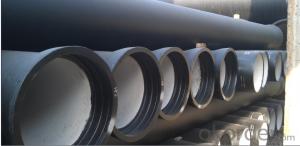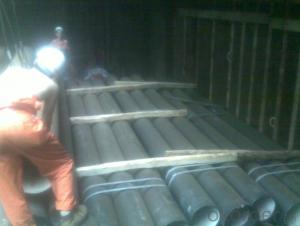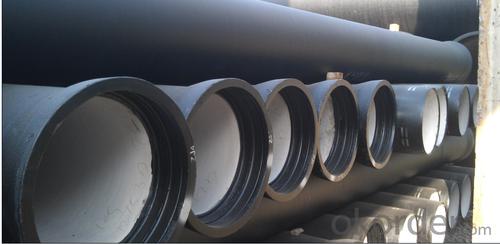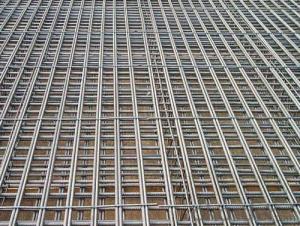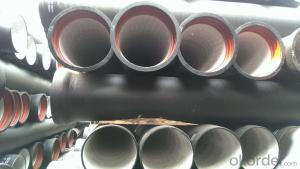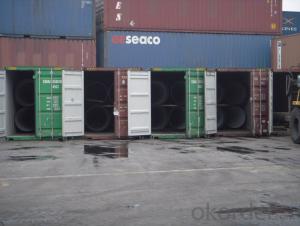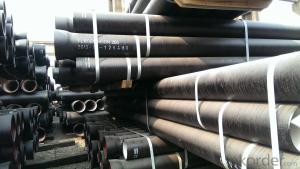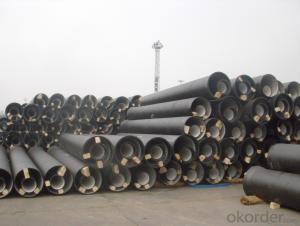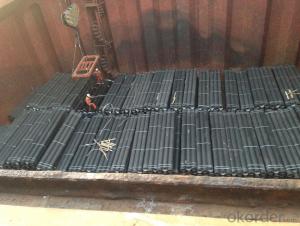DUCTILE IRON PIPE K7 DN 1000 SOCKET SPIGOT PIPE
- Loading Port:
- Tianjin
- Payment Terms:
- TT OR LC
- Min Order Qty:
- 2000 m.t.
- Supply Capability:
- 30000 m.t./month
OKorder Service Pledge
OKorder Financial Service
You Might Also Like
1) The standard of pipe: ISO2531:1998, EN545:2006,K9 K8
2) Effective length: 6m/5.7m
3) Inner cement line: Portland cement lineas per ISO4179
4) Zinc coating: at least 130g/m2 as per ISO8179
5) Bitumen painting: at least 70μm as per ISO8179
6)With 102% quantity of NBR, SBR, or EPDM ring asper ISO4633
7) DN80-DN1200
8) Highstrength, lighter than grey iron, good corrosion resistance, no furring, smallflow resistance, easy fixing, long life tome about 100 yeas
9)Checked by automatic inspection equipment
10) Composition:
Chemical composition | |||
Chemical composition | Ductile Cast Iron Pipe (%) | Grey iron pipe (%) | Steel pipe (%) |
C | 3.5-4.0 | 3.2-3.8 | 0.1-0.2 |
Si | 1.9-2.6 | 1.4-2.2 | 0.15-0.4 |
Mn | 0.15-0.45 | 0.4-0.6 | 0.3-0.6 |
P | ≤0.06 | ≤0.3 | 0.02-0.03 |
S | ≤0.02 | ≤0.1 | 0.02-0.03 |
Mg | 0.03-0.06 |
|
|
11) Feature:
Mechanical properties | |||
| Ductile Cast Iron Pipe | Grey Iron Pipe | Steel Pipe |
Tensile Strength(Mpa) | ≥420 | 150-260 | ≥400 |
Yield Strength(Mpa) | ≥300 | No Confirmation | No Confirmation |
Bending Strength(Mpa) | ≥590 | 200-360 | ≥400 |
Elongation (%) | ≥10 | Neglected | ≥18 |
Brinell Hardness(HBS) | ≤230 | ≤230 | About 140 |
12) T type mechanical joint
13) Packing: in bulk or container
PACKING: 1) Pipesare bundled together with the steel belt.
2) Wooden pieces are put between the pipes.
- Q: How to choose a ductile cast iron pipe with guaranteed quality
- Cutting testing: iron filing resistance, filing issued a "Shua" sound, little sticky file, debris was gray with a small amount of white spot, look at the particles of different size, with small particles of fine powder, finger milling, it is easy to make fingers black. Ductile iron filing: when the resistance ratio of gray iron is slightly larger, there are obvious "Shua" sound ", little sticky file, debris was gray with fine bright particles ranging in size but with large particles, with finger milling chips, can be dyed black to gray fingers, but more black the degree of light
- Q: Can ductile iron pipes be used in areas with high soil acidity?
- Yes, ductile iron pipes can be used in areas with high soil acidity. Ductile iron is highly resistant to corrosion, including the effects of soil acidity, making it a suitable choice for such environments.
- Q: Are ductile iron pipes suitable for installation in areas with high soil compaction?
- Indeed, areas with high soil compaction can accommodate the installation of ductile iron pipes. Renowned for their robustness and longevity, ductile iron pipes exhibit remarkable resistance against external loads and pressures. Their inherent pliability enables them to endure the strains caused by intense soil compaction. Furthermore, ductile iron pipes possess a substantial modulus of elasticity, enabling them to retain their form and structural soundness even when subjected to substantial burdens. Consequently, they present themselves as an exceptional option for regions with high soil compaction, as they adeptly manage the force and deliver dependable and enduring functionality.
- Q: What is the difference between spheroidal graphite cast iron QT400-15 and QT400-15A? What does the A mean later?
- This should be said in front of the material, and later add A, should refer to the grade
- Q: Can ductile iron pipe be used for both water and wastewater applications?
- Yes, ductile iron pipe can be used for both water and wastewater applications. Ductile iron is a type of iron that has been treated with small amounts of magnesium to create a more flexible and durable material. This makes it suitable for transporting both water and wastewater. Ductile iron pipes are known for their high strength and resistance to corrosion, making them ideal for underground applications. They can handle the high pressures and varying flow rates associated with water distribution systems, as well as the corrosive nature of wastewater. Additionally, ductile iron pipes have a longer lifespan compared to other materials commonly used in water and wastewater applications, such as PVC or concrete. Therefore, they are often chosen for projects that require a reliable and long-lasting pipe material for both water and wastewater transport.
- Q: Are ductile iron pipes resistant to seismic events?
- Yes, ductile iron pipes are generally resistant to seismic events. Ductile iron is a type of cast iron that is known for its high strength and durability. It has the ability to withstand significant external forces, including those caused by seismic events such as earthquakes. Ductile iron pipes are designed to be flexible and can absorb and dissipate the energy generated by seismic waves. This flexibility allows the pipes to withstand ground movements and vibrations without breaking or cracking. Additionally, the joints of ductile iron pipes are designed to provide some degree of flexibility, which further enhances their resilience against seismic events. Moreover, ductile iron pipes are constructed with thick walls, providing them with a high level of structural integrity. This strength makes them less susceptible to damage during seismic events and helps maintain the flow of water and other fluids even under extreme conditions. However, it is important to note that the resistance of ductile iron pipes to seismic events can also depend on various factors such as the magnitude and proximity of the earthquake, the quality of installation and maintenance, and the specific design considerations for the pipeline system. Therefore, it is crucial to ensure that proper engineering and construction practices are followed to maximize the resilience of ductile iron pipes in seismic-prone areas.
- Q: How does ductile iron pipe perform in corrosive soils?
- Due to its inherent corrosion resistance properties, ductile iron pipe demonstrates exceptional performance in corrosive soils. This is attributed to its unique composition of iron, carbon, and other elements that enhance its durability and resistance to corrosion. A key feature of ductile iron pipe is its protective lining, which is either cement mortar or a special epoxy coating. This lining acts as a barrier between the corrosive soil and the pipe, preventing direct contact and corrosion. Furthermore, compared to other materials like steel, ductile iron pipe exhibits higher resistance to external corrosion. It can withstand the chemical reactions caused by acidic or alkaline soils and remains unaffected by the corrosive elements present in the ground. This quality makes it an ideal choice for installation in highly corrosive soil areas. Moreover, ductile iron pipe has a long service life, further contributing to its performance in corrosive soils. Its durability and resistance to corrosion ensure that it can withstand the challenges posed by corrosive soils for several decades without significant degradation. In conclusion, ductile iron pipe excels in corrosive soils due to its protective lining, resistance to external corrosion, and long service life. Its ability to withstand the harsh conditions presented by corrosive soils makes it a reliable and durable choice for various applications such as water distribution, sewage systems, and industrial pipelines.
- Q: What is the weight of ductile iron pipes?
- The size and wall thickness of ductile iron pipes can cause their weight to differ. Roughly, a 6-inch diameter ductile iron pipe with a length of 10 feet can weigh around 180 pounds. Nevertheless, it is crucial to acknowledge that weight variations may occur among manufacturers due to disparities in their manufacturing techniques and materials. To obtain precise weight information, it is advisable to refer to the product specifications or reach out to the manufacturer.
- Q: Can ductile iron pipes be used in earthquake-prone areas?
- Yes, ductile iron pipes can be used in earthquake-prone areas. Ductile iron is a flexible and durable material that can withstand seismic activity and ground movements. It has been tested and proven to have high resistance against earthquakes, making it a suitable choice for infrastructure in earthquake-prone regions.
- Q: How are ductile iron pipes inspected for quality control?
- Ductile iron pipes are inspected for quality control through a series of rigorous tests and inspections to ensure their compliance with industry standards. One of the most common methods used is visual inspection, where trained inspectors examine the pipes for any visible defects such as cracks, pits, or surface irregularities. This helps in identifying any visual defects that may compromise the overall quality of the pipes. In addition to visual inspection, another crucial quality control measure is dimensional inspection. This involves measuring the dimensions of the pipes, such as diameter, wall thickness, and length, using specialized tools and equipment. By comparing these measurements against the specified tolerances, any deviations can be identified, and necessary corrective actions can be taken. Another important quality control step is hydrostatic pressure testing. In this test, the pipes are subjected to internal pressure that is higher than their intended operating pressure. This ensures that the pipes can withstand the required pressure without any leakage or failure. The test involves filling the pipes with water and gradually increasing the pressure, while closely monitoring for any signs of leakage or deformation. Furthermore, ductile iron pipes undergo various mechanical tests, such as tensile strength testing and impact testing, to evaluate their mechanical properties. These tests involve applying controlled forces or impacts to the pipes and measuring their response. By doing so, the strength, toughness, and durability of the pipes can be assessed, ensuring they meet the necessary requirements. Lastly, metallurgical examinations are conducted to analyze the microstructure of the ductile iron pipes. This involves taking samples from the pipes and using microscopy techniques to examine the grain structure, phase distribution, and any potential defects at a microscopic level. This helps in identifying any issues that may not be visible to the naked eye but could affect the overall quality of the pipes. Overall, the inspection process for ductile iron pipes involves a combination of visual, dimensional, hydrostatic, mechanical, and metallurgical tests. These quality control measures help ensure that the pipes meet the required standards, providing reliable and durable infrastructure for various applications.
Send your message to us
DUCTILE IRON PIPE K7 DN 1000 SOCKET SPIGOT PIPE
- Loading Port:
- Tianjin
- Payment Terms:
- TT OR LC
- Min Order Qty:
- 2000 m.t.
- Supply Capability:
- 30000 m.t./month
OKorder Service Pledge
OKorder Financial Service
Similar products
Hot products
Hot Searches
Related keywords
